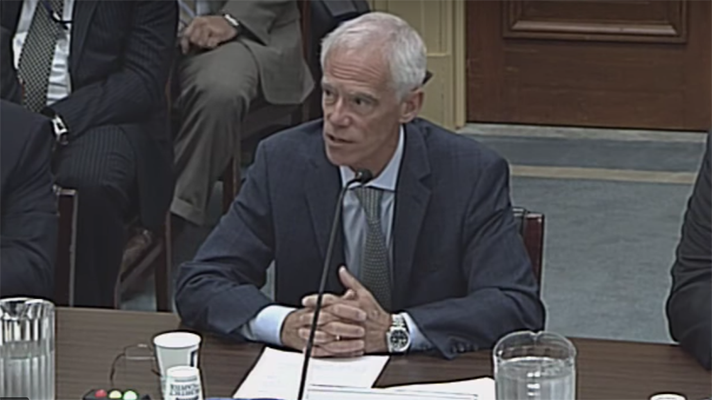Tim Murphy
See the following -
A Bureaucratic Mess Leads to Shutdown of HHS Cybersecurity Center
 In May 2017, the Department of Health and Human Services decided to stand up its own version of the Department of Homeland Security’s National Cybersecurity and Communications Integration Center in order to address the increasing cybersecurity risks to the health care sector. But creating the Health Cybersecurity and Communications Integration Center, or HCCIC, was the easy part. Soon after, the newfound center landed in the spotlight, sparking agency and industry drama about the role and scope of HHS authorities in information sharing.
In May 2017, the Department of Health and Human Services decided to stand up its own version of the Department of Homeland Security’s National Cybersecurity and Communications Integration Center in order to address the increasing cybersecurity risks to the health care sector. But creating the Health Cybersecurity and Communications Integration Center, or HCCIC, was the easy part. Soon after, the newfound center landed in the spotlight, sparking agency and industry drama about the role and scope of HHS authorities in information sharing.
- Login to post comments
An Unfunded EHR Mandate for Behavioral Health: All Stick, No Carrot
Why politics, parity and performance requirements mean behavioral health hospitals should adopt now Read More »
- Login to post comments
Diagnosing the Online Health Exchange Debacle: "Proprietary" Software Needs a Dose of Open Source
As the problem-plagued roll-out of President Obama’s signature healthcare policy undergoes congressional scrutiny for the first time, we speak with Clay Johnson, a former Obama campaign innovation expert who founded Blue State Digital, the company that built Obama’s 2008 website. During a House panel on Thursday, lawmakers questioned executives of two of the lead contractors behind the website, healthcare.gov — CGI Federal and Quality Software Systems Incorporated — about the myriad of glitches and defects. Johnson says the new website is built with outdated and proprietary software. "When the government is building software like this, it ought to be built out in the open — built with a licensing system called open source so that the public truly owns it," Johnson says. He notes that "In 1996, Congress lobotomized itself by getting rid of its technology think tank called the Technology Assessment Office. So they’re writing bills where they don’t understand the technology required in their laws."
- Login to post comments
GM Risked Lives To Save 25 Cents Per Car
Until now, one of the most perplexing questions in the General Motors scandal is why the storied manufacturer waited more than a decade to recall 1.6 million compact cars with faulty ignition switches that contributed to more than a dozen deaths across the country.
- Login to post comments
Halamka: A Time of Great Turmoil in Healthcare IT Policy Making
 We are in a time of great turmoil in healthcare IT policy making. We have the CMS and ONC Notices of Proposed Rulemaking for Meaningful Use Stage 3, both of which need to be radically pared down. We have the Burgess Bill which attempts to fix interoperability with the blunt instrument of legislation. Most importantly we have the 21st Century Cures Act, which few want to publicly criticize. I’m happy to serve as the lightening rod for this discussion, pointing out the assumptions that are unlikely to be helpful and most likely to be hurtful. Read More »
We are in a time of great turmoil in healthcare IT policy making. We have the CMS and ONC Notices of Proposed Rulemaking for Meaningful Use Stage 3, both of which need to be radically pared down. We have the Burgess Bill which attempts to fix interoperability with the blunt instrument of legislation. Most importantly we have the 21st Century Cures Act, which few want to publicly criticize. I’m happy to serve as the lightening rod for this discussion, pointing out the assumptions that are unlikely to be helpful and most likely to be hurtful. Read More »
- Login to post comments
How Do We Balance Civil Liberties With Treatment Of The Mentally Ill?
 In January of this year, political analyst Norman Ornstein lost his 34-year-old son, Matthew, to accidental carbon monoxide poisoning. While Matthew’s death was a tragic blow to family and friends, it was not the kind of out-of-the-blue shock that comes with absolutely no forewarning. Matthew, as Ornstein says in a New York Times op-ed published last month, had struggled with mental illness for 10 years, which contributed to poor decision making and his untimely death. A resident scholar with the American Enterprise Institute and writer for The Atlantic and Washington Post, Ornstein says that perhaps the most difficult aspect of Matthew’s death was the inability of family and friends to help treat Matthew’s mental health challenges after he had his initial psychotic break.
In January of this year, political analyst Norman Ornstein lost his 34-year-old son, Matthew, to accidental carbon monoxide poisoning. While Matthew’s death was a tragic blow to family and friends, it was not the kind of out-of-the-blue shock that comes with absolutely no forewarning. Matthew, as Ornstein says in a New York Times op-ed published last month, had struggled with mental illness for 10 years, which contributed to poor decision making and his untimely death. A resident scholar with the American Enterprise Institute and writer for The Atlantic and Washington Post, Ornstein says that perhaps the most difficult aspect of Matthew’s death was the inability of family and friends to help treat Matthew’s mental health challenges after he had his initial psychotic break.
- Login to post comments
Lawmakers Reaffirm Demand For Biowatch Data
The Homeland Security Department has turned over "substantial" documentation in response to a congressional panel's request for records on a controversial biological agent sensor network, but the Centers for Disease Control and Prevention has not been similarly forthcoming in providing related information, two Republican lawmakers said... Read More »
- Login to post comments
Medsphere Supports Renewed Call for Extension of Financial Incentives for EHR Adoption to Behavioral Health Facilities
Medsphere Systems Corporation...today joined the growing chorus of voices supporting the Behavioral Health Information Technology Act of 2013 (S.1517). This legislation, introduced by Senators Rob Portman (R-OH) and Sheldon Whitehouse (D-RI) a little more than a year ago, would amend the Public Health Service and Social Security acts to define behavioral and mental health professionals as healthcare providers, making behavioral health hospitals eligible for Meaningful Use financial incentives for adopting EHRs. Read More »
- Login to post comments
Medsphere Voices Support for Helping Families in Mental Health Crisis Act of 2015
House legislation seeks to close gaps for families facing mental health challenges, extends federal support for health IT adoption to mental health providers Read More »
- Login to post comments
Securing Health Data Means Going Well Beyond HIPAA
A two-decade-old law designed to protect patients’ privacy may be preventing health care organizations from doing more to protect vulnerable health care data from theft or abuse. The Health Insurance Portability and Accountability Act (HIPAA) established strict rules for how health data can be stored and shared. But in making health care providers vigilant about privacy protection, HIPAA may inadvertently distract providers from focusing on something just as important: overall information security...
- Login to post comments
The Patient Is Mentally Ill. Why Are We Only Treating His Broken Hand?
 Nationwide, the patchwork nature of mental health care—most mental health hospitals lack electronic health records (EHRs)—drives up overall health care costs primarily through expensive emergency department (ED) visits by people who present with apparent mental health challenges. Of course, the disparity between mental and acute health care in the United States is caused by far more than a lack of EHRs in behavioral health settings. But more information enables better care and helps control costs, making it a necessary component in reforming the health care system.
Nationwide, the patchwork nature of mental health care—most mental health hospitals lack electronic health records (EHRs)—drives up overall health care costs primarily through expensive emergency department (ED) visits by people who present with apparent mental health challenges. Of course, the disparity between mental and acute health care in the United States is caused by far more than a lack of EHRs in behavioral health settings. But more information enables better care and helps control costs, making it a necessary component in reforming the health care system.
- Login to post comments